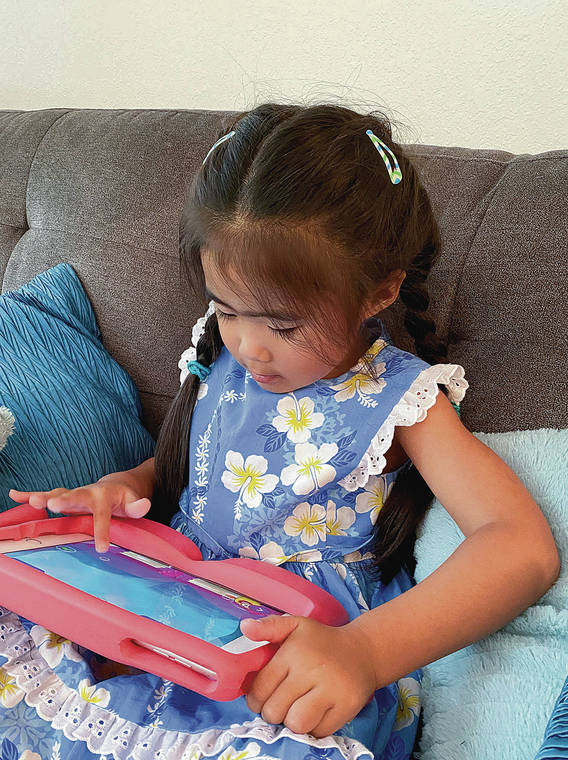HONOLULU — Although the Hawaii State Public Library System’s 51 branches are closed during, people are still flocking to make use of its myriad online resources.
As an indication of interest, about 1,500 new library cards have been issued online since April 13 when readers were allowed to apply, said Danielle Todd, staff development coordinator of the library system. The library staff, none of whom have been laid off, is fielding an average of 250 calls a day from people who need help with the process of downloading a book, or accessing other resources that they’ve never tried using before the shutdown.
“Even though the library itself is closed, our virtual doors are always open, that’s been our tagline, ” Todd said. “There’s a lot of free resources, so if you wanted to look at e-books or e-magazines, if you wanted to look at news from around the world, we’ve got streaming movies. We have really cute Bookflix things for kids that are based on their favorite picture books. There’s a lot on (the website ) that we’re offering, and we’re trying to add more and more as we go.” And everything is free, she added.
On the home page, there are 10 quick links prominently displayed to guide people not only to books, magazines and newspapers, but access to the popular new Kanopy movie-streaming service; Mango, to learn a new language; and to Bookflix, to keep kids engaged in learning.
Before the pandemic, people had to apply for library cards in person, so starting online applications was “a huge win for us,” Todd said. These cards are valid for 45 days, but when libraries are open once again, readers can come in to obtain physical cards.
Old-school readers who have never read a book on a screen and don’t have e-reader devices such as Amazon’s Kindle or Barnes & Noble’s Nook will be glad to know most e-books can be downloaded onto their own computer or smartphone. Once they click on the OverDrive e-book link, they will be prompted to sign up on the Meet Libby app.
There are also OverDrive links for kids, teens, audio books and Korean eBooks; and for e-magazines and e-newspapers, including The New York Times, PressReader and RB Digital.
The Bookflix link for children is a bit different from the e-book section and really cool, Todd said.
“It’s a fun way of learning things when you’re not in school — animated and cute,” she said. Some of the games available can help kids brush up on their vocabulary.
Bookflix allows kids more interactive opportunities while watching an animated picture book of their choice. The story is read aloud by a narrator and accompanied by jaunty tunes, with a read-along option. The story is also offered in a standard book format with pictures. Subjects vary widely from animals and nature; ABCs and 123s; or music and rhyme.
There are bonus interactive programs for each book, such as Word Match and a “Which came first?” puzzlers, with audio prompting in a child’s voice. Additional links invite the young reader to dive deeper into more sources.
Janice Choy, an illustrator/photographer with the state library system, said her daughter Ava Lee Selga “loves going on Bookflix for kids and reading books like ‘Chicka Chicka Boom Boom,’ ‘Curious George’ and ‘Happy Birthday Moon,’ just to name a few. She likes that the words get highlighted as they read along to you, so it makes it fun for her to follow along.
“Our new thing we like to browse is Kanopy,” Choy said. “They have some fun and interesting story times for her to watch. As we wait for her preschool to reopen, we know that she can always count on the library to help occupy her time during this pandemic.”
Todd said one of the most popular programs for all ages is the Kanopy movie link, launched at the beginning of April.
“It’s supposed to be thoughtful entertainment, so there’s a lot of documentaries, independent films, but there’s also a lot of kid movies on there. They’re movies you’re not going to find on Netflix or other streaming services, so they have things like “Arthur, ” or “Sesame Street “— family friendly movies,” she said. “There’s a special selection called Kanopy Kids, and the parent can set up parental controls so that way your kids don’t click on something you don’t want them to see.”
Ready to learn a new languageMango audio books can help teach people a language without paying for expensive software such as Rosetta Stone. There are so many languages to choose from, including Hawaiian, which is not usually available on language-learning software, she said.
“It’s also a great resource for kids — maybe they want to dabble in learning another language. That’s something kids would ask me about, say if they wanted to learn Japanese ; this way they can hear the words and get into it.”
The staff has also been creating story times and crafting videos that will be available soon, Todd added.






